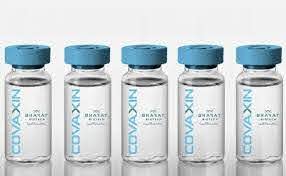Bharat Biotech follows Pfizer and Serum Institute seeks emergency nod for Covaxin
Russia and the United Kingdom are the first two countries that have kick-started the vaccination against COVID-19 and have taken a lead. Meanwhile in India, three vaccine developers, following their after their phase III trials have applied with the drug regulator for emergency use of their vaccines. Hyderabad-based Bharat Biotech filed an application seeking emergency use authorisation for COVAXIN on Monday, becoming the third company to seek such regulatory approval in India after Pfizer and Serum Institute of India (SII).

In India, about 30 vaccines are in different stages of development. Two of them are in the most advanced stage of development - COVAXIN developed through ICMR-Bharat Biotech collaboration and COVISHIELD from the Serum Institute of India. Both are in the Phase-III clinical trial stage. Indian Health Minister, addressing a Technology Summit on Monday, said, “India is in the forefront of developing COVID-19 vaccines. Our premier institution – the Indian Council of Medical Research-is involved in their trial executions. India is also hosting clinical trials for all the major vaccine contenders.”
Serum Institute of India, the world’s largest vaccine manufacturer, is conducting trials for the vaccine developed by Oxford University. ZydusCadila is also conducting Phase II trial of an indigenous DNA Vaccine. One of Indian Pharma giants, Dr Reddy’s Laboratories, will distribute the Russian vaccine in India after conducting final-stage human trials and receiving regulatory approval.
Russia and Britain took the lead over other countries. Moscow began distributing its Sputnik V COVID-19 shot via 70 clinics on Saturday to the most exposed groups, marking Russia's first large-scale vaccination against the disease. The Russian-made vaccine will first be made available to doctors and other medical workers, teachers and social workers because they run the highest risk of exposure to the disease. Russia reported a record daily increase of 29,039 new cases, taking the national total to 2,460,770 since the pandemic began, while the official national death toll rose to 43,141.
Britain is preparing to become the first country to roll out the Pfizer/BioNTech COVID-19 vaccine this week, initially making the shot available at hospitals before distributing stocks to doctors' clinics, according to media reports. The first doses are set to be administered today with the NHS giving top priority to vaccinating the over-80s, frontline healthcare workers and care home staff and residents.
Britain gave emergency use approval for the vaccine developed by Pfizer and BioNTech last week - jumping ahead in the global race to begin the most crucial mass inoculation programme in history.In total, Britain has ordered 40 million doses. As each person requires two doses, that is enough to vaccinate 20 million people in the country of 67 million.
India is also racing against time. COVAXIN is the first fully locally developed vaccine candidate that will be considered for emergency use authorisation. It was developed from a strain of SARS-CoV-2 isolated by ICMR-NIV, Pune. Bharat Biotech is conducting the largest Phase-3 clinical trials in India on 26,000 subjects across 25 sites. At present, phase-3 clinical trials for Covaxin are ongoing in Delhi, UP, Bihar, Maharashtra, Punjab, Assam and other states. The vaccine is based on a two-dose schedule and its efficacy is determined 14 days after the second dosage.
While US drug maker Pfizer has offered its vaccine, developed along with German firm BioNTech, Serum Institute of India (SII) has sought the approval for Covishield, which has been developed by Oxford University and AstraZeneca in the UK. SII has conducted only bridging studies in India but is manufacturing the shots.
The Central Drugs Standard Control Organisation (CDSCO) has already started an internal review of applications submitted by SII and Pfizer, seeking emergency authorisation of their respective vaccine candidates in India. The regulatory authority will examine the applications based on three parameters — safety, quality and efficacy — before providing its recommendations to the Subject Expert Committee (SEC). The SEC, likely to meet this week, will evaluate the suggestions and advise the drug regulator, Drugs Controller General of India (DCGI), on whether emergency authorisation should be granted or not. It may also recommend conditions that may apply to companies manufacturing or marketing the vaccines in India. Usually, the recommendation from the SEC — which comprises domain experts — is accepted by the DCGI, which grants final approval.
